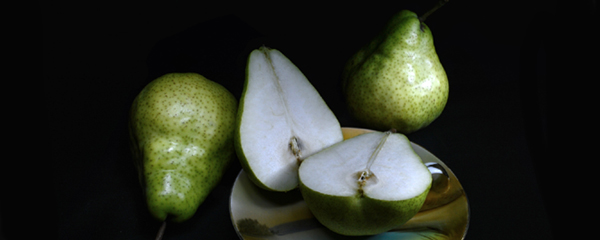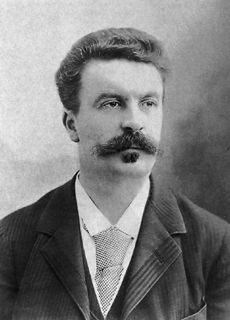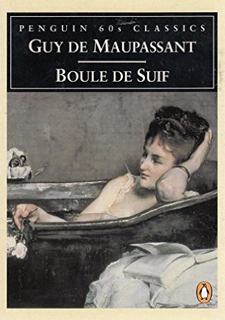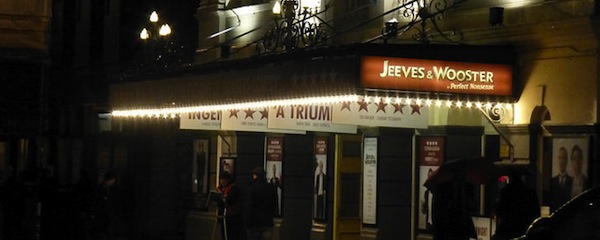
photo © Geoffrey Coelho, 2014
by Allyson Dowling
Guy de Maupassant produced six novels, several plays and more than three hundred short stories over thirteen years (he died in an asylum at forty-three). ‘Boule de Suif‘ is considered his masterpiece, a nouvelle or long short story set to the background (like many of his stories) of the Franco-Prussian war. In the story, a group of wealthy citizens are fleeing from occupied Rouen to Dieppe. Among the party in their coach is a prostitute called Boule de Suif, literally meaning ‘Suet Dumpling’, or ‘Ball of fat’, on account of her corpulent appearance.
Their journey is hampered by snow and the passengers are hungry and cold. No one, except Boule de Suif, thought to bring provisions and she offers to share her generous (and mouth-watering) picnic with them. When the party arrive at an inn they find it is presided over by a Prussian officer, who detains the passengers because he wants to sleep with Boule de Suif. She is a proud patriot and refuses. When the other passengers become impatient and irritated by her refusal to do what ‘was such a trivial thing for her’, a story that begins as a tragicomic romp through the French countryside reveals the darkness at its core. Maupassant peels away the veneers of society to expose the hypocrisy and caprices of human nature.
 The passengers in the coach represent various elements of French society and Maupassant observes them with gleeful wit. The three wealthy and entitled couples are ‘the moneyed, self-assured, solid element of society, the respectable, privileged folk with a proper respect for religion and morality’. Then there is Cornudet, a beer-swilling, bearded ‘revolutionary’, and two nuns, ‘muttering’ their prayers, eyes downcast, ‘no doubt offering up to Heaven the suffering it was inflicting on them’.
The passengers in the coach represent various elements of French society and Maupassant observes them with gleeful wit. The three wealthy and entitled couples are ‘the moneyed, self-assured, solid element of society, the respectable, privileged folk with a proper respect for religion and morality’. Then there is Cornudet, a beer-swilling, bearded ‘revolutionary’, and two nuns, ‘muttering’ their prayers, eyes downcast, ‘no doubt offering up to Heaven the suffering it was inflicting on them’.
Boule de Suif herself is described in less than flattering terms: ‘Short, completely round, fat as a pig, with puffy fingers constricted at the joints like strings of tiny sausages…’ Yet she is also ‘much sought after’ for her ‘freshness’, with a face like ‘a peony bud about to burst into flower.’ When the respectable ladies realise that there is a ‘shameless whore’ in their midst, they band together whispering ‘prostitute’ and ‘absolute scandal’: ‘It was their duty, they felt, to confront this shameless whore with their united marital dignity…’
But Boule de Suif is a woman of spirit and courage, brave enough to challenge them with a bold look. She is also generous and shares her picnic with the rest of the party, offering up such treats as:
…two whole chickens carved up and embedded in aspic … a pâté de fois gras, a lark pâté, a piece of smoked tongue, some Crassane pears, a slab of Pont-l’Evêque cheese…
Upon sharing her food, she becomes a ‘charming companion’. The ladies even condescend to include her in their conversation. Talk turns to the war and Boule de Suif reveals herself as a patriot with passionate convictions. Listening to her, Cornudet smiles:
…with the benevolent approval of an apostle, like a priest hearing a devout member of his flock praising God, for bearded democrats think they have the monopoly of patriotism, just as the men of cassocks do of religion.
Maupassant revels in the physical oddities of a character. In the case of Cornudet, his beard becomes a character in its own right:
For twenty years he had been dipping his long red beard in mugs of beer in all the democratic cafés. When he drank, his great beard, which was the colour of his favourite beverage, seemed to quiver with emotion, and he squinted so as not to lose sight of his mug; he looked as if he were performing the one function for which he had been born.
War and the effects of war on the people and landscape of France features prominently throughout the story. In the opening passages, Maupassant describes the defeated French leaders as ‘temporary warriors who had been elected officers by virtue of their money or the length of their moustaches’. The troops who invade Rouen are a ‘dark mass’ who sweep in: ‘Pouring down all the nearby streets, the cobblestones ringing under the heavy, measured tread of its battalions.’ The occupied town has ‘an unbearable alien atmosphere which hung about like a smell – the smell of invasion’.
The Prussian officer who wants to sleep with Boule de Suif is ‘a perfect specimen of the boorishness which comes naturally to the soldiers of a victorious army’. He also has all the power, reducing the great gentlemen to bowing and scraping in his company. When the party learn of the officer’s demands on Boule de Suif, they at first unite in outrage, ‘in a common feeling of resistance, as if each had been asked to share in the sacrifice demanded of her’. But as time passes and the passengers grow weary, indignation turns to impatience and anger. Boule de Suif’s body, her physicality, is an obstruction to be overcome as they lay plans ‘for the blockade, as though for the siege of a fortress’ and devise:
…the strategies to be employed and the surprise assaults to be delivered in order to force a citadel of flesh and blood to yield admittance to the enemy.
They steer the conversation over dinner towards the idea of self-sacrifice, citing:
…all the women who had halted conquerors by turning their bodies into battlefields, into instruments of domination, into weapons.
They address Boule de Suif as Mademoiselle, instead of Madame, as if ‘to make her conscious of her shameful situation’. They use all their cunning and guile to convince Boule de Suif to surrender. Even the nuns turn out to be useful allies with their ‘veiled complicities’, the elder nun declaring that ‘nothing, in her opinion, could be displeasing to the Lord if the intention was praiseworthy’.
In the end, Boule de Suif, despite her valiant attempts to remain patriotic and true to herself, submits to the officer. The party crassly celebrate, toasting their ‘victory’ as she lies upstairs with him. The following morning the passengers are allowed to board the carriage. When Boule de Suif appears, they all turn away from her: ‘Everybody seemed very busy and gave her a wide berth, as if she were carrying some infection in her skirts.’
 Once in the carriage, the passengers resume their normal lives and revert to their self- delusions as if the interlude had never happened. The men talk: ‘Dividend…fall due…option..mature’. The women discuss a ‘delightful’ acquaintance. The merchant plays with a greasy pack of cards. And the nuns resume their ‘rapid, endless mumbling’. They all ignore Boule de Suif. Worse still, having not had time to bring food, she is reduced to watching in helpless anger as they feast on their veal and pâté and garlic sausage in front of her without offering her anything. This feast is a cruel inversion of the one at the beginning of their journey:
Once in the carriage, the passengers resume their normal lives and revert to their self- delusions as if the interlude had never happened. The men talk: ‘Dividend…fall due…option..mature’. The women discuss a ‘delightful’ acquaintance. The merchant plays with a greasy pack of cards. And the nuns resume their ‘rapid, endless mumbling’. They all ignore Boule de Suif. Worse still, having not had time to bring food, she is reduced to watching in helpless anger as they feast on their veal and pâté and garlic sausage in front of her without offering her anything. This feast is a cruel inversion of the one at the beginning of their journey:
Nobody looked at her: nobody gave her a thought. She felt overwhelmed by the contempt of these respectable boors who had first sacrificed her, and then cast her aside like an unclean object for which they had no further use.
The carriage rolls on, Boule de Suif begins to cry. Then Cornudet, ‘who was digesting his eggs’, begins to whistle the song of the Republic, the ‘Marseillaise’. He keeps up his ‘monotonous, vengeful whistling’ as Boule de Suif sobs in the darkness.
So ends this glorious tale and the fate of its characters. The period and setting may be from nineteenth century France, but the characters are people we can recognise – the armchair revolutionary, the vulgar businessman, the judgemental men and women who make up the group. Maupassant shows no mercy in depicting these people and their behaviour. Nor does he offer an easy resolution for Boule de Suif, perhaps the only character in the story who is gracious, kind and true to herself. Yet the group devours her just as they did her feast.
Often when I’m trying to describe something – a delicious meal, a beautiful landscape or an interesting character – the words I write fail to capture what is in my head and the writing seems dull and stilted. Finding fresh ways to say ordinary things is a struggle, but I am lucky to have an arsenal of stories at my disposal, stories where the writers have elevated description to an art form. Maupassant was incapable of writing a dull sentence. His prose is naturalistic, full of finely wrought and vivid detail. He can describe a character in one compact, pithy phrase: a joyless woman has the ‘soul of a gendarme’ and the temperament of a ‘stinging nettle’; a cowardly revolutionary is ‘the terror of all respectable people’; a vulgar businessman has a ‘commercial-traveller’s mind’.
Every time I read this tale, I am struck again by how easily Maupassant describes the world around him. He takes me right into the heart of the snowy countryside, makes me feel like I am a passenger on the coach moving slowly towards the inn. His descriptions are so powerful, his language so nuanced, that a reader can delve through many layers and find the sharpest observations. It’s one of those stories that inspires me to become more adventurous in my own writing. If we read to become better writers then stories like ‘Boule de Suif’ teach us how.
~
Allyson Dowling is a copywriter and translator with a degree in French and English and diplomas in journalism and translation. Having worked and lived in Paris and Senegal, she now resides in Co. Wicklow in Ireland with her family. Allyson was previously longlisted for the Fish memoir competition and was shortlisted for the Mills & Boon new voices competition in 2010.

